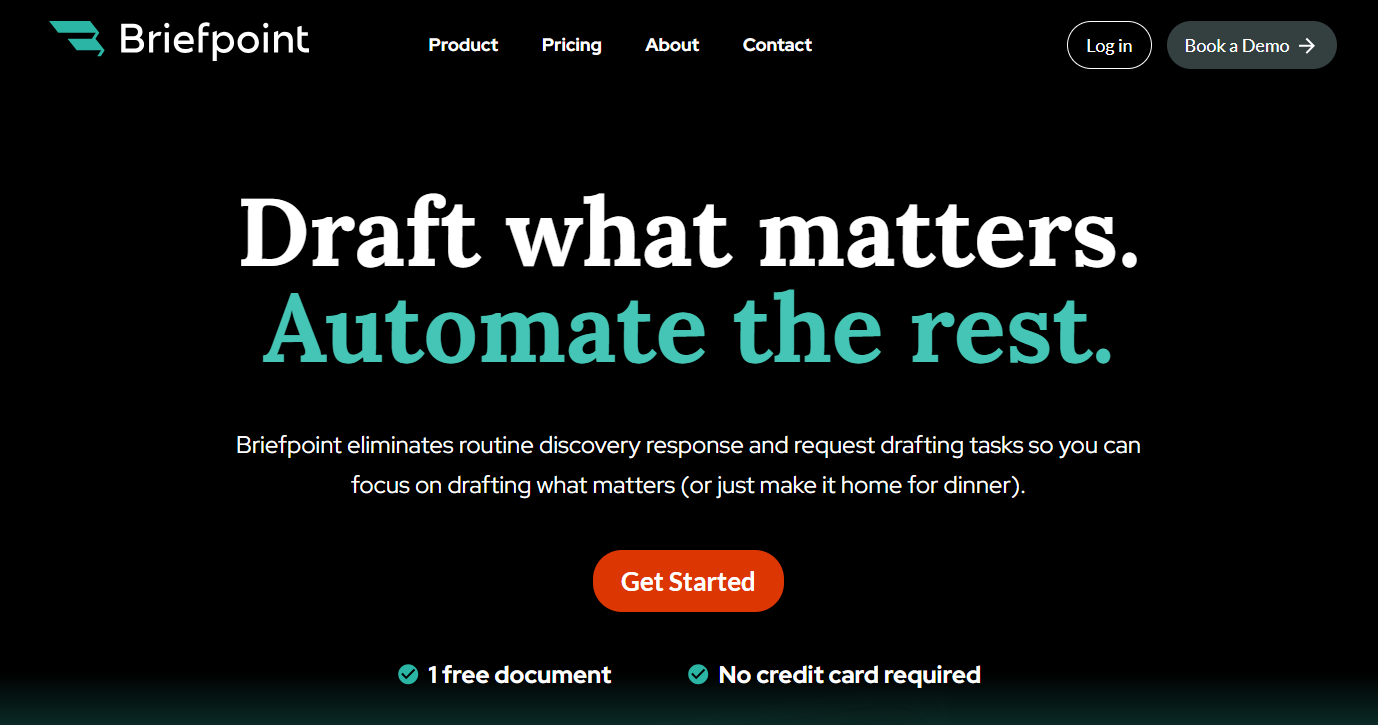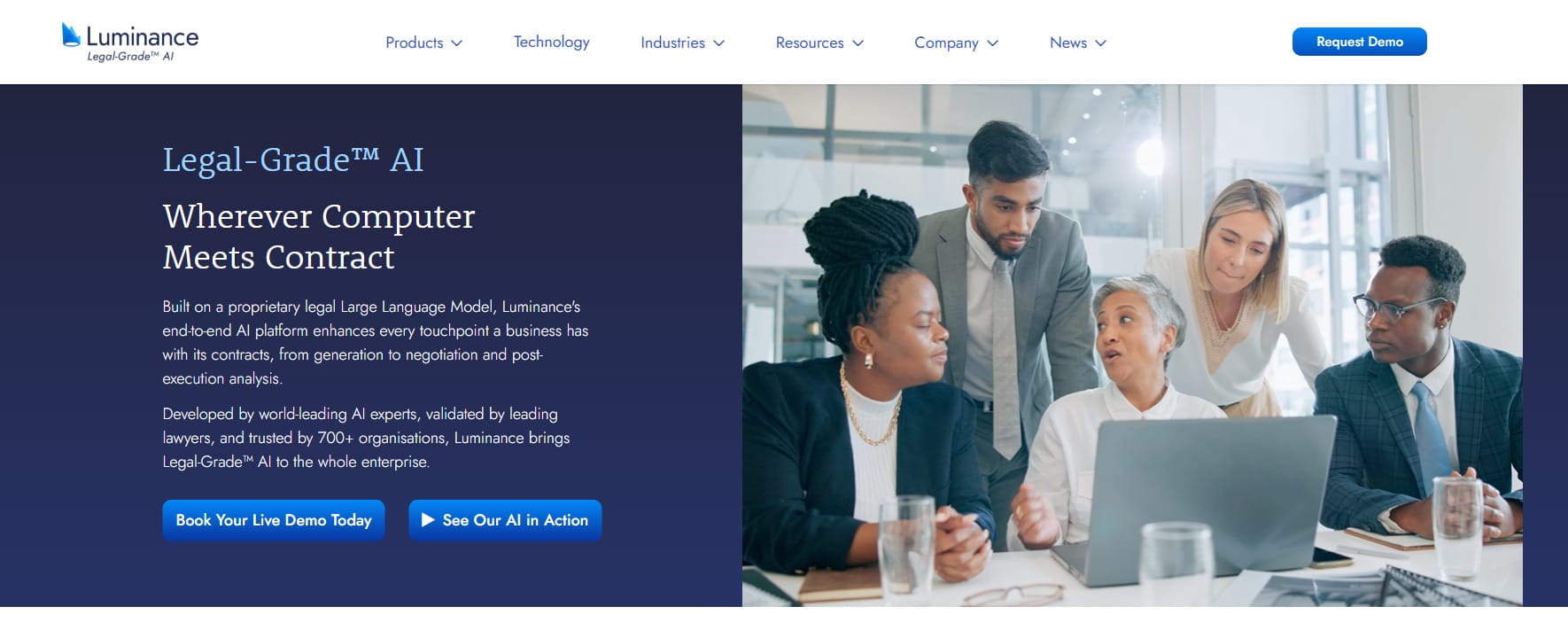What Is an AI Legal Discovery Process?
What Is an AI Legal Discovery Process?
What is the longest part of the litigation process? Ask any lawyer, and they will tell you that it’s definitely discovery.
It’s no surprise, either. Lawyers often have to sift through hundreds of relevant documents, spend days on research, and create legal documents on top of it all. However, that was all before artificial intelligence entered the picture.
From technology-assisted review to early case assessment, AI has and continues to change how lawyers work. Let’s take a look at how AI’s transformative power affects the discovery process in today’s law firms.

What Are the Biggest Challenges in Manual Discovery?
Manual discovery often means sifting through massive amounts of data to find what’s relevant to a case. It’s a necessary step in the legal industry, but it’s not without its challenges—it can slow things down, lead to errors, and drive up costs.
More specifically, the manual discovery phase is:
- Too time-consuming: Legal professionals must sift through thousands, sometimes millions, of documents, emails, digital evidence, and other data forms to collect relevant information. This process can take weeks or months, which can delay case timelines and consume valuable resources.
- Excessively costly: Given its labor-intensive nature, manual discovery can be incredibly expensive. The more time legal teams spend on discovery, the higher the billable hours, which increases clients’ legal fees.
- Prone to human error: Even the most detail-oriented legal professionals can get fatigued, which makes it easy to miss key details or misinterpret information when sorting through endless documents.
- Lacking standardization: Manual discovery methods differ from firm to firm, leading to inconsistencies in how data is collected, reviewed, and presented. Without a clear approach, important details can be handled differently—or even missed entirely—depending on who’s reviewing the information.
- Physically and mentally taxing: The sheer volume of work involved in manual discovery can lead to burnout among legal teams. The stress of meeting tight deadlines and the monotonous nature of the work can have a huge impact on their well-being and, in turn, job performance.
How Can AI and Machine Learning Improve Legal Discovery?
The main goal of AI-powered legal discovery is to take over the most tedious tasks and reduce (if not eliminate) the challenges mentioned above. But what does this mean exactly?
Here are the best ways law firms can apply artificial intelligence in legal discovery work:
Automated Document Review
AI-powered document review takes the grunt work out of sifting through massive amounts of data. Instead of spending hours (or days) manually reviewing documents, automation quickly picks up on patterns, keywords, and key details—way faster and more accurately than humans can.
It’s not just about speed, though. AI helps catch inconsistencies, flag important connections, and reduce the risk of missing something crucial. That means legal teams can spend less time buried in paperwork and more time focusing on strategy.
Discovery Document Generation
Creating discovery documents – like discovery requests and, even more so, discovery responses – can take hours when done manually, which can negatively affect a legal team’s productivity.
Legal AI tools help minimize this hurdle by using artificial intelligence, machine learning, and Natural Language Processing (NLP) to draft documents in seconds instead of hours.
Document generation tools like Briefpoint automatically generate discovery documents based on standard templates. Afterward, you can easily customize these documents based on the specifics of the case and put the finishing touches on Word.
It’s easy, intuitive, and takes up much less time than manual document creation.
Faster Legal Research
AI tools take legal research to the next level by quickly scanning massive legal databases, statutes, case laws, and precedents to identify data that are most relevant to a case.
That means lawyers get instant access to key information, which cuts down the time spent searching through documents and strengthening their arguments.
These tools do more than speed things up. They improve accuracy, analyzing electronic data with precision to make sure no critical detail is overlooked. Legal teams can move forward knowing their case strategy is backed by thorough, well-researched information.
Regulatory Compliance
Keeping up with the constant change of regulations and compliance requirements is a daunting task for most legal professionals. AI and ML models can monitor regulatory updates in real time and make sure law firms remain compliant with current laws and regulations.
This is particularly beneficial for firms dealing with cross-border cases or operating in multiple jurisdictions, where regulatory compliance is complex and always evolving.
What Does an AI-Powered Discovery Process Mean for Law Firms?
Integrating AI into the legal profession clears the way for many advantages. From better productivity to maximizing your bottom line, here are some of the ways AI can take the discovery phase to the next level:
Better Efficiency and Time Management
AI and machine learning algorithms automate the most time-consuming parts of discovery, such as sifting through massive volumes of documents, identifying relevant data, and drafting discovery documents.
Less time spent on these tedious tasks allows lawyers to focus on more strategic aspects of their cases, such as formulating arguments and engaging with clients.
In other words, AI gives attorneys more time to work on higher-value tasks that are more important for the outcome of the case.
Additionally, efficient legal workflows go hand in hand with improved work-life balance for legal teams. This is an important aspect that many gloss over, but when people have a better relationship with work, they tend to be more productive, consistent, and satisfied with their jobs.
Improved Consistency and Accuracy Across Legal Documents
AI technologies can maintain a high level of consistency and accuracy across all legal documents generated during the discovery process.
Unlike humans, who may accidentally introduce errors or inconsistencies into their work, AI systems follow programmed rules so that every document adheres to the same standards and formats.
Uniformity and accuracy are a must in legal proceedings. The quality and reliability of documentation can significantly impact case outcomes, and having problematic documents can waste even more time and money for both clients and legal teams.

Law Firm Profitability
What is the point of introducing AI tech to the legal profession? We already know that the direct benefits are better efficiency, consistency, and accuracy. However, it all boils down to increasing law firm profitability.
Automating repetitive and mundane tasks reduces the billable hours typically required. Cost savings for clients means better competitiveness for the law firm, which can lead to more referrals.
More importantly, efficient operations allow firms to handle a heavier caseload without the need to expand the team. This can lead to better profit margins, career development for current employees, and higher chances of business expansion in the future.
Tech-Informed Law Firms
With more and more law firms shifting to electronic discovery, staying up-to-date with legal software has become a necessity in recent years.
Today’s law firms may have a hard time keeping up with the competition if they don’t adapt to legal trends, and we can only expect these technologies to evolve even further down the line.
Best AI-Driven Discovery Tools of 2025
Now that we’ve established the advantages of AI and machine learning in the discovery process, it’s time to talk about the best tools that let you access these benefits.
Here are some of the top AI-powered technologies that can help make discovery easier, faster, and more valuable:
1. Briefpoint
Briefpoint is a powerful tool that uses generative AI to draft discovery responses and request documents. Manually creating these documents can take hours, if not days, which is a huge bottleneck that can increase litigation costs.
With Briefpoint, however, you can generate content within minutes.

The documents Briefpoint can draft include but are not limited to:
- Requests for Admission
- Requests for Production
- Interrogatories
Using this discovery tool is simple. You just have to upload your discovery request, add objections or responses, and finish up on Microsoft Word. Briefpoint takes care of the nitty gritty in between with data-driven accuracy and precision.
Plus, there’s a built-in feature called Bridge, which makes collecting client responses much faster and easier. Bridge lets you translate interrogatories into plain, easy-to-understand language and send them to your client.
Once your client responds, Bridge will automatically plug their answers into your document. That means no more back-and-forth emailing!
Book a demo today to test Briefpoint’s full capabilities!
2. Logikcull
Logikcull simplifies the discovery process with its intuitive, cloud-based platform that automates data processing, document review, and case preparation.

Source: G2
Its artificial intelligence system speeds up the discovery process by automatically categorizing and reviewing electronically stored information. As a result, law firms can spend less time on manual document review and save money on data storage.
3. Luminance
Luminance uses proprietary machine learning algorithms to provide a detailed analysis of legal documents at speeds no human could match.

Source: Luminance.com
It is particularly effective in due diligence and contract analysis and can identify anomalies and patterns that might indicate risk or require further investigation.
Luminance’s AI understands language and document structure in a way that mimics human cognitive processes but with the ability to process information on a much larger scale.
Maximize Your Bottom Line With an Automated Discovery Process
Automating legal discovery starts a domino effect in your law firm. First, you upgrade your efficiency, which leads to better productivity and time management.
In turn, you’ll have more positive case outcomes and get more referrals from satisfied clients. At the end of the chain is a more competitive law firm and a superior bottom line.
With automation, your team can focus on high-value legal work instead of getting bogged down in tedious document reviews. So, are you ready to make the shift?
Get rid of the burden of creating discovery documents by hand. If you want to start optimizing your discovery process with state-of-the-art AI, book your free demo today!
Slash Hours From the Discovery Phase With Briefpoint
Discovery responses cost firms $23,240, per year, per attorney. $23,240 estimate assumes an associate attorney salary of $150,000 (including benefits – or $83 an hour), 20 cases per year/per associate, 4 discovery sets per case, 30 questions per set, 3.5 hours spent responding to each set, and 1800 hours of billable hours per year.
Book a demo and save on these costs with Briefpoint.
FAQs About the AI Legal Discovery Process
Is AI going to replace lawyers?
No, AI or e-discovery is intended to augment the capabilities of lawyers, not replace them. It handles the tedious aspects of legal work, allowing lawyers to focus on complex decision-making and continuous active learning.
How does AI ensure the confidentiality of sensitive information?
AI systems designed for legal work are built with stringent security measures and comply with privacy laws to protect sensitive information. Still, it’s important to read the terms and conditions to ensure the tools you are using are safe and secure.
Can small law firms afford AI-based discovery tools?
Yes, many AI tools are scalable and available as services, making them accessible to firms of all sizes. You can start with the basic packages, but you may need to expand to premium features or new tools as your law firm expands.
The information provided on this website does not, and is not intended to, constitute legal advice; instead, all information, content, and materials available on this site are for general informational purposes only. Information on this website may not constitute the most up-to-date legal or other information.
This website contains links to other third-party websites. Such links are only for the convenience of the reader, user or browser. Readers of this website should contact their attorney to obtain advice with respect to any particular legal matter. No reader, user, or browser of this site should act or refrain from acting on the basis of information on this site without first seeking legal advice from counsel in the relevant jurisdiction. Only your individual attorney can provide assurances that the information contained herein – and your interpretation of it – is applicable or appropriate to your particular situation. Use of, and access to, this website or any of the links or resources contained within the site do not create an attorney-client relationship between the reader, user, or browser and website authors, contributors, contributing law firms, or committee members and their respective employers.